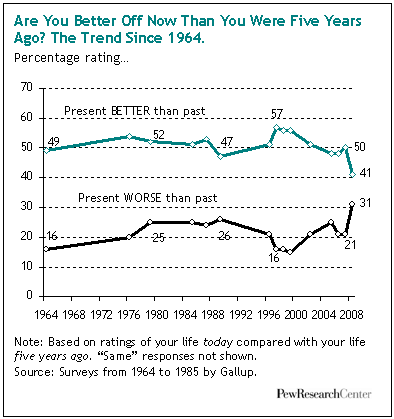04.11.08
Middle Class In Trouble
Two recent items highlight the plight of the middle class in America.
First this Pew Research report, Inside the Middle Class: Bad Times Hit the Good Life, which states:
Fewer Americans now than at any time in the past half century believe they’re moving forward in life.
Americans feel stuck in their tracks. A majority of survey respondents say that in the past five years, they either haven’t moved forward in life (25%) or have fallen backwards (31%). This is the most downbeat short-term assessment of personal progress in nearly half a century of polling by the Pew Research Center and the Gallup organization.
Here’s what it looks like:

It’s pretty easy to see that from the late ’80’s to now there was only one time when that number got really low.
The second one is a from the Center for Budget and Policy Priorities and the Economic Policy Institute and takes a look at how the states are faring, PULLING APART: A State-by-State Analysis of Income Trends:
A state-by-state examination of trends in income inequality over the past two business cycles finds that inequality has grown in most parts of the country since the late 1980s. The incomes of the country’s highest-income families have climbed substantially, while middle- and lower-income families have seen only modest increases.
[…]
Similarly, families in the middle of the income distribution have fallen farther behind upper-income families in many states since the late 1990s:
- On average, incomes have grown by just 1.3 percent among the middle fifth of families since the late 1990s, well below the 9.1 percent gain among the top fifth. Income disparities between the top and middle fifths have increased significantly in Alabama, California, Florida, Illinois, Mississippi, Missouri, New Mexico, and Texas. Income disparities did not decline significantly in any state.
The benefits of economic growth were broadly shared for a few years in the late 1990s — the only period in the past two decades for which this was true — but this broad-based growth ended with the 2001 downturn. Once the effects of the recession were left behind, the trend toward greater inequality quickened, as the incomes of the richest families climbed while those of low- and moderate-income families stagnated or declined.
It’s makes good sense that at the same time that inequality is increasing between middle class families and the country’s highest-income families that the middle class would also be feeling the most “donwbeat” they have about their future in 50 years.
If anything it will be this that causes massive change in November. High gas prices, high food costs, high home heating and cooling costs, and on and on and on.